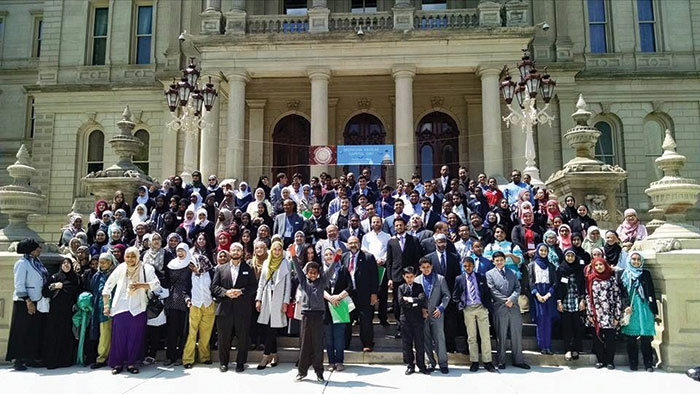
LANSING — Last Tuesday, Muslim and Arab Americans met with state legislators for Muslim Capitol Day to discuss issues plaguing their communities and ways the officials could assist in promoting better attitudes toward minority ethnic groups.
Dr. Muzammil Ahmed, chair of the Michigan Muslim Community Council (MMCC), who organized the capitol day, said the group’s aim was to ensure that elected officials do not stay silent about bigotry against ethnic groups.
“We expect the people that represent us to speak up, take a stand and say that this is unacceptable,” Ahmed said.
He added that the MMCC wanted legislators to know about the positive efforts community members are engaged in, like assisting families affected by the Flint water crisis.
Ahmed said this year’s visit to Lansing attracted a record number of about 300 people interested in engaging with their elected officials.
The high turn out was because of an increased level of concern among community members regarding the current presidential election and certain candidates running for office, he said.
“People are realizing that we cannot be silent,” Ahmed said.
Ahmed said he was “pleased” with the number of Republican state senators who signed on as co-hosts, but was disappointed by the “callus attitude” of two of them, Patrick Colbeck of Canton Township and Michael McCready of Bloomfield Hills, who refused to sign on as co-hosts of the MMCC.
Ahmed said the students who participated in the event were “amazed” by the impact state senators and representatives had on making a difference and explored employment opportunities in government.
Suhaib Al-Hanooti, an advocacy and civic engagement specialist for the National Network for Arab American Communities, a program of ACCESS, said he met with legislators in Lansing who showed great support for the advocacy of Muslim and Arab Americans’ concerns.
Al-Hanooti said the topic of Islamophobia took center stage during the capitol day. He said the opportunity to meet with legislators helped his group network and build bridges and create coalitions with them and other organizations to increase voter registration and turn out. Increased political involvement means greater representation in government, he added.
“It shows that we’re active, we have a voice and we do have concerns,” Al-Hanooti said.
Al-Hanooti said several other organizations from different communities were represented at the capitol day, all of which faced similar struggles and shared the same vision toward a future of nondiscrimination.
He said many of those who accompanied him were young college students, a symptom of one of the most contentious presidential races in recent years.
“They’re energized,” Al-Hanooti said.
“They got to meet first-hand the lawmakers and they got to network. They want to become promoters and go back to their community and spread the message.”






Leave a Reply